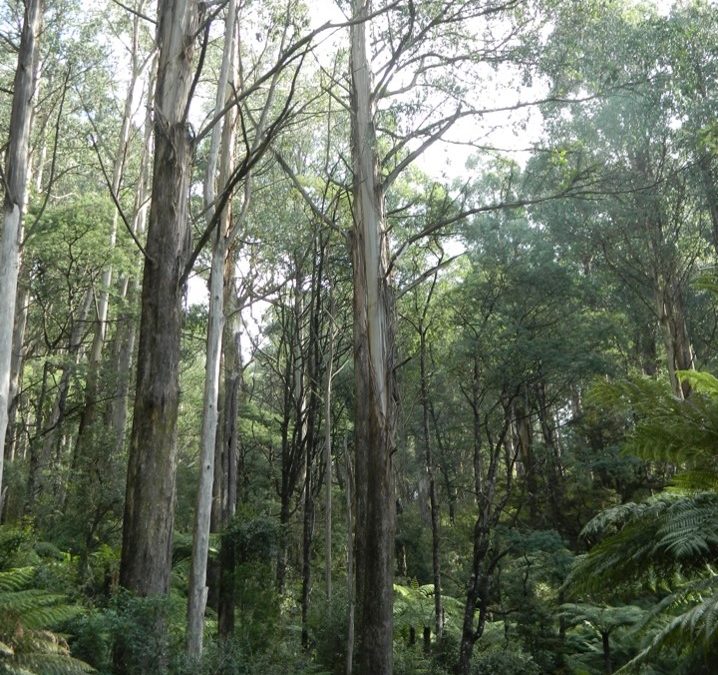Forests store amazing amounts of carbon
The amount of carbon stored in the world’s forests is more than the carbon stored in fossil fuel reserves and more than the total carbon added to the atmosphere as a consequence of human activities in the last 150 years. In the 2019/20 fires nearly 3 billion animals were killed or displaced. Despite this, our native forests continue to be logged and the Amazon may be approaching a tipping point. Johan Rockström talks about this in Episode 4 of his wonderful series. Protecting our remaining forests is more important and urgent than ever.
Four wonderful speakers
On 28 October, Lighter Footprints was very fortunate to hear from four speakers on the front line to save our remaining forests and the precious flora and fauna for which they provide habitat.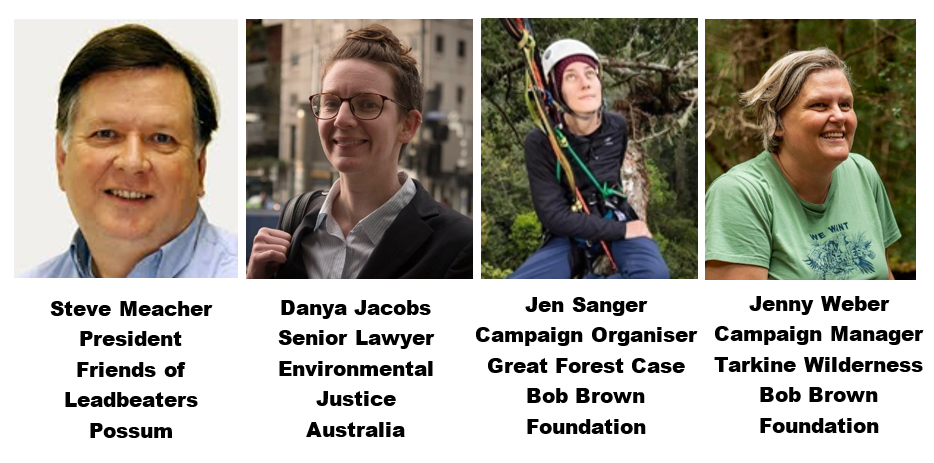
The Central Highlands
Steve Meacher is President of Friends of the Leadbeater’s Possum and a co-founder of WOTCH. After the 2009 fires, Steve served on the Toolangi and Castella Community Recovery Committee and in 2013 was named the Shire of Murrindindi’s Citizen of the Year. Steve is actively involved in the current court case against VicForests and is a passionate advocate for Victoria’s forests and the endangered species within them.
Steve explained that Leadbeater’s Possum, one of Victoria’s faunal emblems, was first described by Frederick McCoy in 1867 and later rediscovered by naturalist Eric Wilkinson in 1961. It is currently listed as critically endangered and is one of Australia’s 20 ‘priority mammals‘.
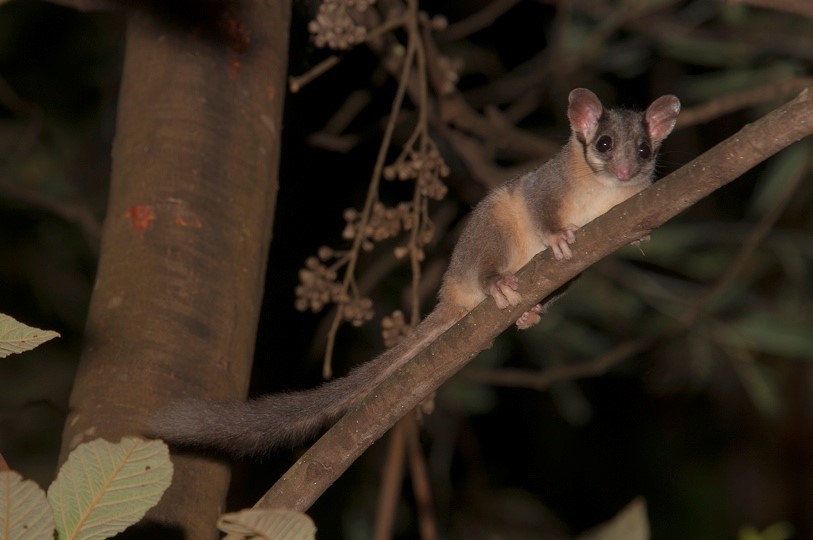
In addition to the possum, the forests of the Central Highlands are a critical water catchment for Melbourne’s water and they provide habitat for other endangered plants and animals such as the Greater Glider, Barred Galaxia and Tree Geebung. Twenty years of monitoring across 175 sites in the Mountain Ash Forests has shown that the Leadbeater’s Possum has declined by almost two thirds over the last twenty years, while the Greater Glider population has halved within the region in the last ten years.
Steve explained that despite Mountain Ash being the tallest flowering tree in the world and the best carbon sink, Victoria’s Ash forest is logged, pulped and shipped off for paper and cardboard. Biomass left behind (about 50%) from the clear felling is burned further degrading the habitati, threatening the survival of any remaining habitat trees and releasing greenhouse gases.
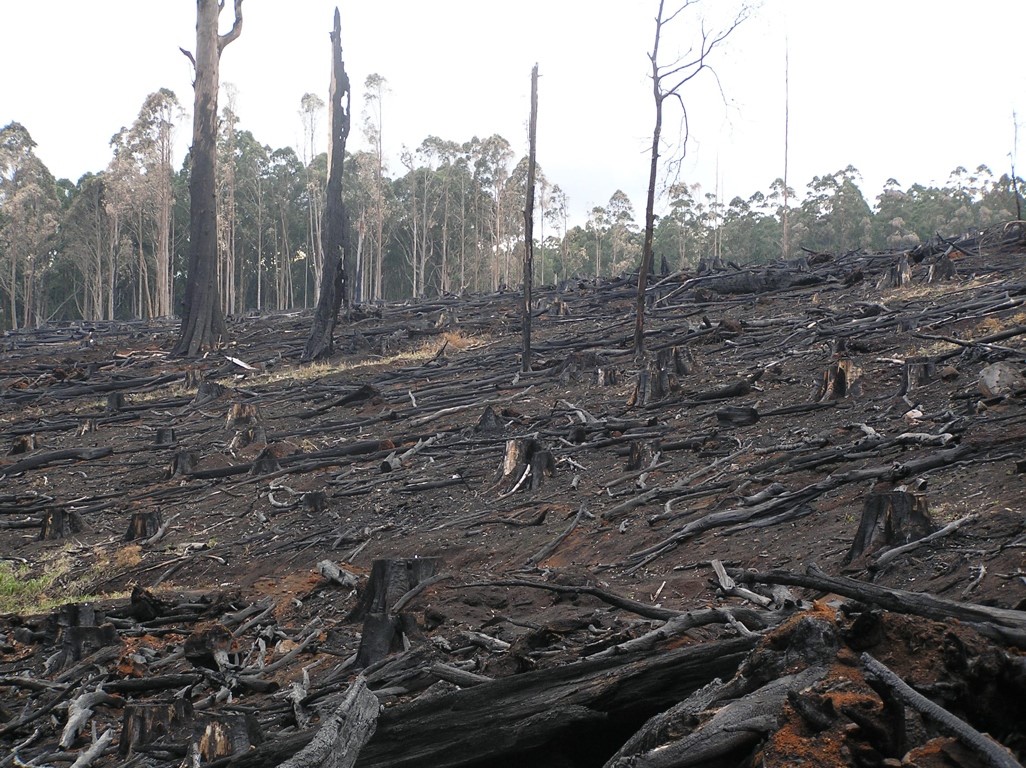
Steve also explained how, in addition to DELWP’s pre-harvest surveys, Friends of Leadbeater’s Possum and Wildlife of the Central Highlands (WOTCH) actively monitor coupes designated for logging, map mammal sightings, habitat trees and Tree Geebungs and record any breaches of the code of practice by VicForests of its regional forestry agreement. Breaches were identified in 66 coupes and court action against VicForests was initiated in 2017.
The most significant breach of the Code alleged in the case is non-compliance with the precautionary principle laws in certain forests where Greater Gliders are living. The principle requires logging operations to avoid serious or irreversible damage to the species wherever practical. Greater Gliders are known to be threatened by logging yet logging continues in habitat where Gliders have been sighted.
The Possums Case
The Possums Case is only the second case ever brought in the 21-year history of Australia’s national environment protection law that challenges the special exemption given to the logging industry from laws that protect threatened species, via Regional Forest Agreements (RFAs).
Led by Senior Lawyer for Environmental Justice Australia (EJA), Danya Jacobs, the Possums Case sought to stop logging in 66 areas of forest. Danya explained that in addition to the breach of the precautionary principle, several other breaches had occurred relating to protection possum habitat, 20 metre visual screens along roads, no more than 150 metre gaps between retained vegetation, and failure to protect endemic plant species such as the Tree Geebung.
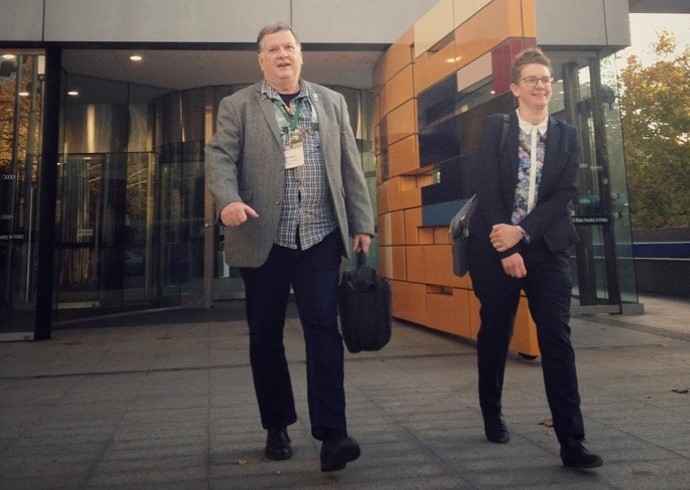
A huge win with national significance
On 27 May 2020, the Federal Court delivered its judgment Justice Mortimer found that logging operations in certain areas of forest in Victoria’s Central Highlands failed to comply with the Victorian Code of Practice for Timber Production, a requirement under the Regional Forest Agreement. RFAs are the basis for the exemption for logging operations from national environment law. The non-compliance with the RFA means the exemption does not apply and VicForests must comply with national environmental laws.
This landmark decision sets an important legal precedent applying federal threatened species protection law to the logging industry, which has operated under a special exemption from federal environment law for more than 20 years. It will have national implications for species threatened by logging under Regional Forest Agreements across the country which will now face much greater scrutiny.
Outcomes
The court win prompted Bunnings to stop stocking VicForest products and has started a number of challenges to logging operations across the country including in Tasmania. Sadly VicForests has lodged an appeal to try and undo the court’s decision and is taking Friends of Leadbeater’s Possum back to court. A Chuffed appeal has been launched to raise funds to continue the fight. You can help the fight by donating today if you Click here:chuffed.org/project/protect-our-possums
Old Growth Case:
Danya also described the Old Growth Case in far East Gippsland. These ancient forests are home to rare Gondwana rainforest found nowhere else on Earth along with endangered owls, potoroos and gliding possums. In October 2017, on behalf of the Fauna and Flora Research Collective (FFRC), EJA commenced urgent legal proceedings in the Victorian Supreme Court after finding out that VicForests had built a logging road and pegged out a coupe, ready to start clearing trees in the Kuark forest.
The case was filed in November 2017, initially to protect the ancient Kuark forest, and a temporary injunction was ordered by the Supreme Court to halt logging until the case was determined in Court. The case has now expanded to include over thirty areas of old-growth forest earmarked for logging in Victoria’s East Gippsland.
The case alleges that VicForests and the Department of Environment, Land, Water & Planning (DELWP) have not protected the minimum area of old-growth forest required by law, and that until it does, logging in these areas of old-growth forest is unlawful and must not go ahead. In this case the FFRC (Fauna and Flora Research Collective) is seeking orders to protect the minimum area of old-growth forest required by law across East Gippsland (60%). It also seeks to stop logging planned at over thirty areas of intact old-growth forests in East Gippsland that have never been logged.
In November 2019, while awaiting judgement on the case, the Victorian government made a forest policy announcement that signaled an end to old-growth forest logging in Victoria. However, despite the positive headline, the devil in the detail showed that the government’s plans do not place the remaining old -growth forests in protection zones as the rules require. The case has now been reopened and EJA is again working around the clock with the FFRC to prepare the case to defend these ancient forests. The hearing is scheduled from the 5 November. Stay tuned.
Other cases in Victoria
Danya reported that other legal teams have lodged forest protection cases in regard to Tree Geebungs and screening on behalf of the Warburton and Kinglake groups. And in January 2020, on behalf of WOTCH, EJA also launched a Supreme Court case against VicForests to stop the state-owned agency from logging areas of unburnt habitat for threatened species impacted by the bushfires – including the Greater Glider, Sooty Owl, Powerful Owl and Smoky Mouse.
The EPBC Act
Finally, Danya expressed concerns about recent announcements from state and federal governments. Our current environment laws are too weak, they don’t protect threatened species on the path to extinction. And enforcement of these laws by government agencies is also inadequate – the regulatory system is not working. These points were made in the preliminary report by Graeme Samuel in his review of Australia’s Environmental Protection and Biodiversity Conservation (EPBC) Act. But rather than take the recommendations of the interim report on board (e.g. national standards to protect endangered species) or wait until the final report, due soon, the Morrison Federal Government has already moved to hand over responsibility to the States. This is likely to further weaken, rather than strengthen, protection of endangered species.
To support the wonderful work of Environmental Justice Australia, you can donate here. Donations to EJA are tax deductible.
The Great Forest Case
Jen Sanger, Campaign Organiser at the Bob Brown Foundation (BBF), explained how, encouraged by the ‘Possums Case‘, the Foundation has launched the ‘Great Forest Case’. Tasmania has some incredible forests, including the Tarkine region (Tasmania’s N-W) which is the largest tract of temperate rain forest left in Australia. Home of the takayna people it is extremely rich in cultural and archaeological history.
Tasmania’s forests are home to the critically endangered Swift Parrot, the stunning Tasmanian giant freshwater crayfish, the largest in the world, and a beautiful sub-species of masked owl. Logging impinges on all three of these iconic animals through removal of old-growth trees with hollows and by silting up streams and rivers. These species are federally listed for protection under the EPBC Act.
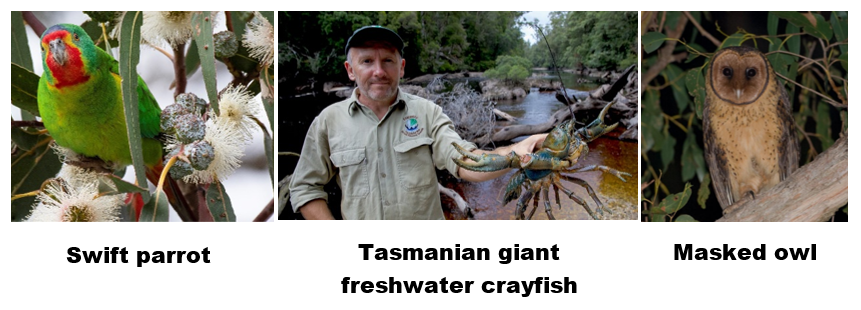
Jen explained how the Great Forest Case (GFC) will challenge the regulation of native forest logging. The case will argue the Tasmanian Regional Forest Agreement (RFA) is not a valid agreement. The GFC is the best chance in a generation to stop native forest logging.
By its nature, the ‘Great Forest Case’ is different to the ‘Possums Case‘. The Possums Case argued that logging wasn’t following the rules of the RFA, whereas the GFC will argue that the rules aren’t valid.
A GFC win will halt logging in all coupes with threatened species, about 90% of the coupes in Tasmania. The Foundation is prepared to take this case all the way to the High Court. Winning the case will have ramifications in all jurisdictions with RFAs. (Note: Qld is the only jurisdiction without a RFA)
The case has started well with an injunction covering 19 coupes, all habitat of the Swift Parrot and 850 hectares in total The court has also agreed to have an urgent hearing in the first week of December. It will be possible to follow the case online.
The other work of the Bob Brown Foundation
Jenny Weber, Campaign Manager, took us through some of the history and work of the Bob Brown Foundation. Jenny explained how our forests have endured 25 years of disastrous RFAs and that the logging industry is the only industry that has an exemption from the national environment laws. The disastrous RFAs show us why the Morrison government’s plan to handover environmental responsibility to state RFAs is such a bad idea and a useful reference for letter writing.
The BBF is working to make the Tarkana/Tarkine into a National Park managed by the local Tarkiner people, and fighting to protect nearly 700,000 hectares of native forest in Tasmania. You can support the work of the BBF by making a donation here.
Australian Native Forest Declaration
Jenny announced that the BBF has recently launched the Australian Native Forest Declaration, modeled on the 1975 New Zealand declaration. You can sign the declaration here.
Questions and Answers
Q1: What actions were taken to get Bunnings to stop sourcing VicForests timber?
Steve explained how Friends of LBP have been meeting with Bunnings and others over several years. A letter was written to Bunnings at the start of 2020. Once the court ruled that VicForest actions had been unlawful, Bunnings acted rather than source unlawful timber. FLBP have also written to Nippon Paper in Japan. Nippon now own the Maryvale mill and buy pulp from VicForests. About 90% of the logged forest is pulped for paper, about 10% is used for wood products but only about 2% of that is high quality product such as furniture and window frames.
Q2: How can Lighter Footprints best support the court actions and the work of EJA, the BBF and FLBP?
Jenny explained how Bob Brown is strong believer in the value of letter writing to newspapers and politicians. Letters can generate the conversation and build momentum behind the movement. And writing to interstate papers makes it a national conversation. The BBF provides other ways to get involved also such as Bioblitz Citizen Science, Canopy Camp-outs, participating in blockades in the Tarkine etc. For all events go to the calendar page. But legal cases are very expensive so donations are welcome and needed. Donations to the BBF are tax deductible. But just spreading the word about the GFC and the Declaration would be terrific.
Q3: What tact should we take with local MPs about environmental law and the review of the EPBC Act?
Jen replied that making the link between logging and bushfires is useful. Forests that have been logged burn at a higher severity than those that haven’t. Also the role that forests play in combating climate change by storing carbon and providing habitat for endangered species which have been so severely affected by recent fires. Steve added that the forests are worth much more standing than logged. Just the value of the water alone is worth 25 times the value from logging. The economics argument doesn’t work, the jobs argument doesn’t work. A consultant’s report a few years ago showed that there are more jobs in tourism and regenerative forestry than in logging the forests.
Summary
It’s time to act. While we can’t all protest by camping out in the forest, we can write letters, sign the declaration or make a donation. Click on the links above or copy and paste these URLs into your browser.
Australian Native Forest Declaration: https://www.bobbrown.org.au/anfd
FLBP Possums case: https://chuffed.org/project/protect-our-possums
Environmental Justice Australia: https://www.envirojustice.org.au/donate/
Bob Brown Foundation: https://www.bobbrown.org.au/donate
WOTCH: Buy your Christmas cards from the WOTCH shop
Video recording
An edited video of the meeting can be found here.

